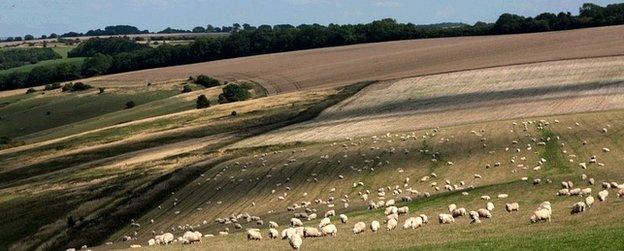Why rural affairs matter in this election
- Published

Rural communities could play an important role in deciding the outcome of such a tight election. So which issues are likely to be the major debating points for parties hoping to win votes in rural areas?
Rural affairs is a largely devolved power in Northern Ireland, Scotland and Wales.
What's at stake?
It's not all about fox hunting and badgers. Political parties will need to make voters who live outside cities and towns feel included in the debate. Around 12 million people call the countryside home.
The economy, healthcare, education, transport - many issues are the same, but reflected through a rural prism. So it's about the closure of the only library for 50 miles, the cutting of the single bus link between a moorland village and a town, how second homes are creating ghost villages.
Rural voters will want politicians to answer some difficult questions: where will you build new houses? How should farmers produce more food without destroying biodiversity - can you be clear what you think about pesticides and GM food? How many solar farms and wind turbines do you want, and where should they go?
And, of course, there's the badger cull to control bovine TB. And the ban on fox hunting.

What are the numbers?
On average, house prices in rural areas in the UK are 11 times the average salary - 44% of the "unaffordable" places to buy a house are rural. The price paid to farmers for their milk has fallen by about a third in less than a year - the number of dairy farmers in England and Wales has halved in just over a decade.
UK food and drink exports have grown by 4.8% to £6.5bn. Some £7.5m funding has been announced to establish 12 Nature Improvement Areas across the country. Farmland birds are at their lowest levels since records began.

What won't the politicians be saying?
Building on green belt land isn't something most parties want to talk about, but the pressure to build more homes is so great that it will happen in some places.
Renewable energy is another complex issue. Our legal commitments to reducing carbon emissions mean we will have more solar parks and onshore wind turbines, which could spark controversy in rural areas.
And despite pressure from some quarters, parties won't be rushing to revisit the fox hunting debate after the election.

What has happened since 2010?
Controversial culling of badgers, as part of effort to stop the spread of TB in cattle, implemented in two areas of England. Questions over how effective it is means it won't be rolled out across the country
Approval given for first of planned generation of new nuclear reactors - Hinkley C, set to be constructed in Somerset, although big delays expected
Role of Groceries Code Adjudicator created, designed to regulate relationship between supermarkets and suppliers. Has been criticism the remit is too narrow and powers aren't strong enough
Subsidies for large-scale solar farms on fields where crops once grew, stopped
Family of beavers allowed to live wild on the River Otter in Devon

What do the experts say?
"It is more important than ever that the countryside has an effective voice and is not disadvantaged by predominantly urban-focused legislation" - the Country Land and Business Association
"Across our society and economy, nature is still a foundation that is largely invisible and unaccounted-for. We know nature is under great pressure as we take from it to fuel our economy without giving back, and many of the worrying effects were outlined in last year's State of Nature report produced by 25 conservation organisations. Our existing environment laws are strong, and they provide protection for our wildlife, but now we need to go further - we need recovery" - the Royal Society for the Protection of Birds (RSPB)